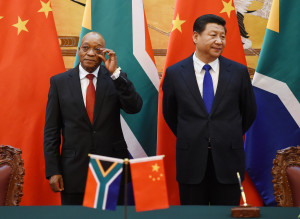One of the prevailing media narratives of China's recent economic turmoil is the effect that it could have on emerging markets, particularly in Africa. Now that the Chinese economy is showing real signs of slowing, the story goes, Beijing will soon pull back on the billions of dollars in investments and purchases that it makes from commodity-exporting African markets.
While there is no question that China's demand for iron ore, petroleum and other raw materials will inevitably be reduced as demand in the PRC slows, it nonetheless remains highly speculative as to just how severe the impact might be in Africa. What so much of the reporting, largely from the West, seems to overlook is just how active Beijing has been in recent months in its commercial diplomacy both in Africa and elsewhere in the developing world. Most recently, President Xi Jinping announced a $2 billion package of aid and development global anti-poverty initiative that will likely include significant loan forgiveness for a number of lesser developed African countries.
Conversely, a growing number of African economists believe that reduced Chinese economic engagement on the continent provides a unique opportunity for African leaders to initiate badly-needed economic reforms that could strengthen their domestic economies and reduce dependency on international investment.
Thembinkosi Gcoyi, managing director of Pretoria-based Frontline Africa Consulting, is among those who sees a unique chance for Africa to realign its economic priorities, both with China and the West. Gcoyi, a former diplomat who spent four years as an economic counselor at the South African embassy in Beijing, joins Eric & Cobus -- in the podcast above -- to discuss his outlook for African-Chinese economic relations.
Original Article
Source: huffingtonpost.com/
Author: Eric Olander, Cobus van Staden
While there is no question that China's demand for iron ore, petroleum and other raw materials will inevitably be reduced as demand in the PRC slows, it nonetheless remains highly speculative as to just how severe the impact might be in Africa. What so much of the reporting, largely from the West, seems to overlook is just how active Beijing has been in recent months in its commercial diplomacy both in Africa and elsewhere in the developing world. Most recently, President Xi Jinping announced a $2 billion package of aid and development global anti-poverty initiative that will likely include significant loan forgiveness for a number of lesser developed African countries.
Conversely, a growing number of African economists believe that reduced Chinese economic engagement on the continent provides a unique opportunity for African leaders to initiate badly-needed economic reforms that could strengthen their domestic economies and reduce dependency on international investment.
Thembinkosi Gcoyi, managing director of Pretoria-based Frontline Africa Consulting, is among those who sees a unique chance for Africa to realign its economic priorities, both with China and the West. Gcoyi, a former diplomat who spent four years as an economic counselor at the South African embassy in Beijing, joins Eric & Cobus -- in the podcast above -- to discuss his outlook for African-Chinese economic relations.
Original Article
Source: huffingtonpost.com/
Author: Eric Olander, Cobus van Staden

No comments:
Post a Comment